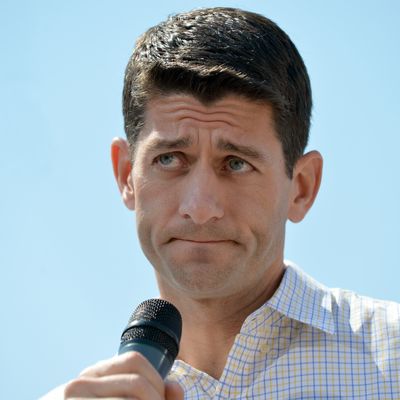
Paul Ryan’s biggest takeaway from the 2012 election seems to be that he has to talk about poverty much more than he has in the past. He has been making regular trips to meet with poor people, and announced on Morning Joe yesterday, “I’m focused on poverty these days.” Which, in a sense, is true! Just not exactly in the sense Ryan wants you to think.
Ryan grasped the political difficulty during the election, which inspired him to deliver a speech in Cleveland on empowering the poor. Ryan grasped that the perception that his career had been inspired by the philosophy of Ayn Rand, and that his policy agenda enacted a vast upward redistribution of wealth, had become a political liability:
I would argue that this perception exists because Paul Ryan called Ayn Rand “the reason I got involved in public service,” and that his entire policy agenda has in fact enacted a vast upward redistribution of wealth. But never mind.
It’s unfair to Ryan to describe his agenda vis-à-vis the poor as mere exploitative posturing. There is a real agenda there. Ryan’s very simple belief is that the main problem afflicting the poor is that the government gives them too much money, sapping their incentive to work hard and better themselves. He wants to rectify that.
Ryan’s poverty speech last fall laid out the theory pretty well. “Here’s the problem,” he said. “The welfare-reform mindset hasn’t been applied with equal vigor across the spectrum of anti-poverty programs.” That is, cut them, giving the poor the kick in the ass they need.
Now, that view of the world did work pretty well with welfare. But it worked for two very specific reasons. The first was the problematic design of the program. Traditional welfare was designed to replace a working father, and wound up creating a huge incentive for its recipients not to work at all. Recipients could become ineligible by obtaining a job or getting married. Second, welfare reform was passed in the midst of a red-hot late-nineties economy that created lots of job opportunities for low-skilled workers.
Neither of these conditions applies to cutting other anti-poverty programs today. Ryan proposed that we “apply this idea to other anti-poverty programs, such as Medicaid and food stamps.” But those programs are not designed to replace the role of a breadwinner — they’re designed to provide basic necessities for people who are poor.
Just last week, the House provided another example of Ryan’s anti-poverty principles in action. It enacted a large cut in food stamps, as Ryan has been calling for. Then, concluding this hadn’t gone far enough, it added a provision allowing states to cut off beneficiaries who didn’t have a job. As Robert Greenstein explained, this was completely unlike the welfare provisions designed to encourage people to get jobs:
Work requirements in low-income programs require unemployed people to look for jobs, to accept any job offer, to participate in workforce or training programs if there is a slot available in a program, and the like. If the individuals fail to comply with the requirements, they can be sanctioned by having their benefits cut or terminated. The SNAP program also disqualifies people who quit a job.
This is not what the Southerland amendment would do. It would allow states to end benefits for most adults who receive or apply for SNAP — including parents with young children and many people with disabilities — if they are not working or participating in a work or training program for at least 20 hours a week. The amendment provides no jobs and no funds for work or training programs, and it does not require states to make any work opportunities available. People who want to work and are looking for a job but haven’t found one could be cut off.
A conventional analysis would call this approach cruel, bordering on sociopathic. It’s one thing to tailor policy to encourage people to work. It’s another to create a new punishment for people who can’t find jobs. And given the baseline reality of mass unemployment for low-skilled workers, and a bill that proposes nothing to create more jobs or even job training, the Southerland amendment would do nothing but punish the poor. Ryan voted for it, naturally.
And, of course, if you reject the standard demand-side model of the economy, as Ryan does, and instead believe that people are unemployed because they lack the incentive or gumption to find work, then this makes sense. Your anti-poverty agenda is to make life as a poor person as miserable as possible so people decide to stop being poor. Or else you regard the poor with genuine indifference or disdain. Either way, Paul Ryan’s idea of focusing on poor people does not mean anything especially nice.






























